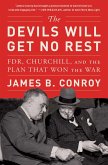Some of the worst military disasters in U.S. history occurred between Pearl Harbor on December 7, 1941 and the Battle of Midway in June 1942. During this period, the American people faced a barrage of bad news and accounts of defeats and retreats. Yet if they were shocked and dismayed, they showed little panic.
Indomitable Will resurrects the legacy of this first half-year of American combat during WWII -a legacy of pain, but not of woe. Historian Charles Kupfer recounts the story of the war's early defeats: Bataan, Corregidor, Wake Island, and the Java Sea. Some of these battles remain evocative today; others are obscure; all were catastrophes for American arms. Kupfer asserts, however, that later victories were made inevitable by the steeling effect of those initial disasters.
Weaving together military, journalistic, political, and cultural histories, this engaging book shows that by setting their collective will on victory, Americans in and out of uniform gained strength from their setbacks. Indomitable Will spells out how the nation turned early defeat into ultimate victory.
Indomitable Will resurrects the legacy of this first half-year of American combat during WWII -a legacy of pain, but not of woe. Historian Charles Kupfer recounts the story of the war's early defeats: Bataan, Corregidor, Wake Island, and the Java Sea. Some of these battles remain evocative today; others are obscure; all were catastrophes for American arms. Kupfer asserts, however, that later victories were made inevitable by the steeling effect of those initial disasters.
Weaving together military, journalistic, political, and cultural histories, this engaging book shows that by setting their collective will on victory, Americans in and out of uniform gained strength from their setbacks. Indomitable Will spells out how the nation turned early defeat into ultimate victory.









